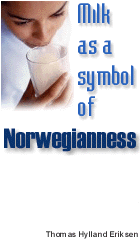|
|
 Bjornstjerne Bjornson
Bjornstjerne Bjornson
|
poet, dramatist, novelist, journalist, editor, public speaker, theatre director, and one of the most prominent public figures in the Norway of his day. He was awarded the Nobel Prize for Literature in 1903 and is generally known, together with Henrik Ibsen, Alexander Kielland, and Jonas Lie, as one of “the four great ones” of 19th-century Norwegian literature. His poem “Ja, vi elsker dette landet” (“Yes, We Love This Land”) is the Norwegian national anthem.
 Bjornson, the son of a pastor, grew up in the small farming community of Romsdalen, which later became the scene of his country novels. From the start his writing was marked by clearly didactic intent; he sought to stimulate national pride in Norway's history and achievements and to present ideals. For the first 15 years of his literary career he drew his inspiration from the sagas and from his knowledge of contemporary rural Norway. He exploited these two fields in what he described as his system of “crop rotation”: saga material was turned into plays, contemporary material into novels or peasant tales. Bjornson, the son of a pastor, grew up in the small farming community of Romsdalen, which later became the scene of his country novels. From the start his writing was marked by clearly didactic intent; he sought to stimulate national pride in Norway's history and achievements and to present ideals. For the first 15 years of his literary career he drew his inspiration from the sagas and from his knowledge of contemporary rural Norway. He exploited these two fields in what he described as his system of “crop rotation”: saga material was turned into plays, contemporary material into novels or peasant tales. Both stressed those links that bound the new Norway to the old; both served to raise the nation's morale. The early products of this system were the peasant tale Synnove solbakken (1857; Trust and Trial, Love and Life in Norway, and Sunny Hill), the one-act historical play Mellem slagene (1857; “Between the Battles”), and the tales Arne (1858) and En glad gut (1860; The Happy Boy) and the play Halte-Hulda (1858; “Lame Hulda”).
In 1857–59 he was Ibsen's successor as artistic director at the Bergen Theatre. He married the actress Karoline Reimers in 1858 and also became the editor of the Bergenposten. Partly because of his activity with this paper, the Conservative representatives were defeated in 1859 and the path was cleared for the formation of the Liberal Party a short time later. After traveling abroad for three years, Bjornson became director of the Christiania Theatre, and, from 1866 to 1871, he edited the Norsk Folkeblad. During this same time there also appeared the first edition of his Digte og sange (1870; Poems and Songs) and the epic poem Arnljot Gelline (1870).
Bjornson's political battles and literary feuds took up so much of his time that he left Norway in order to write. The two dramas that brought him an international reputation were thus written in self-imposed exile: En fallit (1875; The Bankrupt) and Redaktoren (1875; The Editor). Both fulfilled the then current demand on literature (stipulated by the Danish writer and critic Georg Brandes) to debate problems, as did the two dramas that followed: Kongen (1877; The King) and Det ny system (1879; The New System). Of his later works, two novels are remembered, Det flager i byen og pa havnen (1884; The Heritage of the Kurts) and Pa Guds veje (1889; In God's Way), as are a number of impressive dramas, including Over ?vne I og II (1883 and 1895; Beyond Our Power and Beyond Human Might). The first of the novels deals critically with Christianity and attacks the belief in miracles, whereas the second deals with social change and suggests that such change must begin in the schools. Paul Lange og Tora Parsberg (1898) is concerned with the theme of political intolerance.
Later in life, Bjornson came to think of himself as a Socialist, working tirelessly in behalf of peace and international understanding. Bjornson enjoyed worldwide fame, his plays were influential in establishing social realism in Europe, and he was awarded the Nobel Prize in 1903. Nonetheless, his international reputation has diminished in comparison with that of Ibsen.
|
 |
|
Anons
|

|
|
Partners
|

|
|

